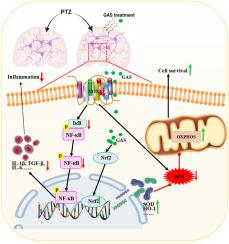Gastrodin from the Gastrodia elata Blume alleviates neuronal inflammation and injury via regulates NOX2/Nrf2 balance
IF 4.6
2区 医学
Q1 NEUROSCIENCES
引用次数: 0
Abstract
Background
Epilepsy is a serious recurrent neurological dysfunction, and its incidence is increasing sharply, often causing social dysfunction in patients and causing heavy economic and caregiving burdens to families and society. At present, most drugs used in the clinical treatment of epilepsy have serious side effects, such as liver and kidney function damage, psychological and physiological damage, and drug dependence.
Methods
The antiepileptic effect of gastrodin (GAS, a natural compound isolated from Gastrodia elata Blume) was studied in a PTZ-induced epilepsy rat model. The pharmacological effect of GAS was further clarified by combining animal behaviour and pathology detection experiments. H2O2 stimulation of the HT22 cell model was subsequently used to further explore the possible molecular mechanism of the antiepileptic effect of GAS. Molecular docking experiments and siRNA interference experiments were used to study the molecular mechanism of the antiepileptic effect of GAS.
Results
GAS can also improve the learning and memory ability of experimental animals. The antiepileptic effect of GAS was related to its obvious neuroprotective effects, including significantly reducing the apoptosis of hippocampal neurons in epileptic rats, reducing oxidative stress in neurons, and reducing the level of inflammation in the body. The experimental data revealed that GAS participated in the regulation of the NOX2/NRF2 balance, reduced the level of cellular oxidative stress, reduced the level of cellular inflammation, and protected against neuronal damage. In addition, we also showed that GAS has good affinity for NOX2, with a binding value of −5.12 kcal/mol. Knocking down NOX2 is expected to weaken the neuroprotective effect of GAS.
Conclusion
GAS can reduce inflammation and apoptosis in nerve cells by affecting the NOX2/Nrf2 balance.

天麻素通过调节NOX2/Nrf2平衡减轻神经炎症和损伤。
背景:癫痫是一种严重的复发性神经功能障碍,发病率呈急剧上升趋势,常造成患者社交功能障碍,给家庭和社会带来沉重的经济和护理负担。目前临床上用于治疗癫痫的药物大多存在严重的副作用,如肝肾功能损害、心理生理损害、药物依赖等。方法:采用ptz诱导的大鼠癫痫模型,研究天麻素(GAS)的抗癫痫作用。结合动物行为学和病理学检测实验进一步阐明了GAS的药理作用。随后利用H2O2刺激HT22细胞模型,进一步探讨GAS抗癫痫作用可能的分子机制。采用分子对接实验和siRNA干扰实验研究GAS抗癫痫作用的分子机制。结果:瓦斯还能提高实验动物的学习记忆能力。GAS的抗癫痫作用与其明显的神经保护作用有关,包括显著减少癫痫大鼠海马神经元凋亡,减轻神经元氧化应激,降低机体炎症水平。实验数据显示,GAS参与调节NOX2/NRF2平衡,降低细胞氧化应激水平,降低细胞炎症水平,保护神经元免受损伤。此外,我们还发现GAS对NOX2具有良好的亲和力,其结合值为-5.12 kcal/mol。抑制NOX2可能会削弱GAS的神经保护作用。结论:GAS可通过影响NOX2/Nrf2平衡来减轻神经细胞的炎症和凋亡。
本文章由计算机程序翻译,如有差异,请以英文原文为准。
求助全文
约1分钟内获得全文
求助全文
来源期刊

Neuropharmacology
医学-神经科学
CiteScore
10.00
自引率
4.30%
发文量
288
审稿时长
45 days
期刊介绍:
Neuropharmacology publishes high quality, original research and review articles within the discipline of neuroscience, especially articles with a neuropharmacological component. However, papers within any area of neuroscience will be considered. The journal does not usually accept clinical research, although preclinical neuropharmacological studies in humans may be considered. The journal only considers submissions in which the chemical structures and compositions of experimental agents are readily available in the literature or disclosed by the authors in the submitted manuscript. Only in exceptional circumstances will natural products be considered, and then only if the preparation is well defined by scientific means. Neuropharmacology publishes articles of any length (original research and reviews).
 求助内容:
求助内容: 应助结果提醒方式:
应助结果提醒方式:


